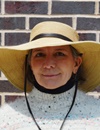At our September 27 meeting, most of us could not remember the International President's name, resulting in a decent collection for Tail Twister PHIL. A sign of our ages, or lack of interest? GLENN attended his first meeting in quite some time. (Hint - more Lions who have missed several meetings are always welcome to return,)
We were fortunate enough to have our international traveler ROSS as our program speaker, and he gave us a wonderful program. ROSS was in the Peace Corp in the '70's in Brazil and he was impressed by the Portuguese architecture there. The Portuguese colonized Brazil, and imported their particular style of building. He wanted to find out more about that style, so he booked a riverboat cruise in Portugal (only one of many of his trips to exotic places). Portugal (literally the port of the gods) was invaded by the Celts, the Romans, and the Muslims. In the 1500's and 1600's, Europeans were colonizing around the world, and Portugal and Spain divided South America, with Portugal getting the eastern half and Spain getting the western half. In 1755, an earthquake on All Saints Day destroyed much of the infrastructure, resulting in most of the architecture of early Portugal remaining only in Brazil.
ROSS told us that 95% of the world's bottle cork is grown in Portugal. The tree must be at least 25 years old, and the bark can only be harvested every nine years. Cork is used in many ways, and is actually fire-resistant. ROSS was sporting a cork baseball cap, made with a very thin layer of cork. He brought us some samples of cherry liquor in chocolate cups. Portugal is also famous for custard pies. The main meat eaten there is sardines, but a larger fish than the Norwegian kind we're familiar with. St Anthony spoke to the sardines. Climate change is hurting the sardine industry. Portugal is also famous for its beaches and surfing, with some of the largest waves in the world (he didn't say if he tried surfing).
Portugal is also famous for tiles. They last forever, reflect heat, and never need painting. There is a strong Moorish influence on tiles produced in Portugal. Many of the walkways are sandstone mosaics. LIke many European countries, many of the streets are narrow canyons between the buildings.
OUR NEXT MEETING on October 11 will be a business meeting, both live-in-person and virtual. As usual, informal socializing at 11:30, and meeting to start at noon. Hope to see you there.
Upcoming Events:
• October 11 - Business Meeting
• October 16 - District Cabinet Meeting
• October 18 - Mount Horeb Lions Club 65th Annual Charter Night
• October 22 - Highway Cleanup
• October 25 - Program Meeting

